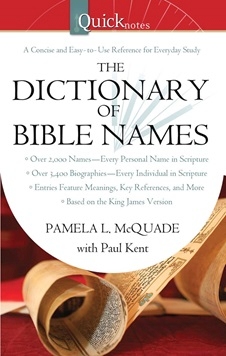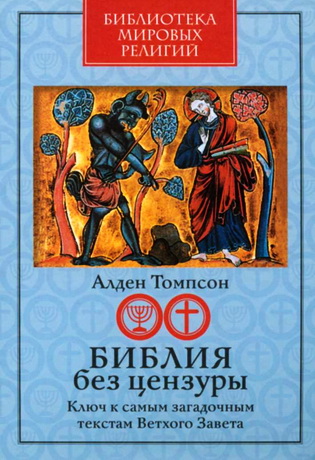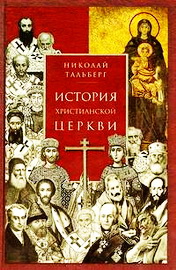
McQuade - Kent - QuickNotes Dictionary of Bible Names
Paramela McQuade with Paul Kent - QuickNotes Dictionary of Bible Names
Barbour Publishing, 2009. – 400 p.
Print ISBN 978-1-60260-480-3
eBook Editions: Adobe Digital Edition (.epub) 978-1-62836-450-7
We have based this Dictionary of Bible Names on the King James Version of the Bible and Strong’s Expanded Exhaustive Concordance of the Bible (Nashville/Thomas Nelson, 2001). The King James Version is the standard text for many Christians, and James Strong based his widely used concordance on it—so instead of reworking our entire volume to another, perhaps passing, translation, we have used these favorite and familiar volumes as the starting place for our work.
For the 2,026 proper names in scripture, covering some 3,400 people, the Dictionary of Bible Names provides readers with concise information in the following categories:
- Number of Times Mentioned—providing the number of times the name is found in the King James Version.
- Number of Men and Number of Women—since, as today, some names can be used by both men and women, the number of references for each gender has also been included.
- Genealogy of Jesus—when scripture indicates that a person was part of Jesus’ family tree, it is shown by a crown graphic, as well as separate scripture references.
- Meaning—where possible, a name translation based on Strong’s Hebrew and Aramaic Dictionary and The New Strong’s Expanded Dictionary of the Words in the Greek New Testament is provided.
- Biography—an outline of each person’s history. For those mentioned only once or twice, this information is necessarily brief. More prominent individuals receive proportionately longer entries.
- References—including the first (or only) time the name appears in scripture and the last. Where many references describe one person, some key references for that biography have also been provided.
- Where a person had more than one name or where scripture provides us with variations of the name, alternative names or spellings are listed at the end of the biography section. For example, Jashub’s biography includes the information “Same as Job (1),” referring readers to the first listing for the name Job. Please note that we have not included titles or the names of spirit beings in this dictionary.
In a few cases, readers will find differences here from what is shown in Strong’s. One man, working manually on such a large project, was bound, perhaps, to make some minor errors. On top of that, scholarship through the ages has given us varying answers to questions about confusing references. Scholars of any age may differ on whether, for example, a person mentioned in one of the biblical name lists is the same as one mentioned in another place. Where a name is listed multiple times and references are not clear, we have made use of existing scholarship to determine one logical solution.
For the many hundreds of people recorded in scripture, this Dictionary of Bible Names will provide the concise information you need to quickly understand each individual’s background, prominence, and contribution to history. We hope it will spur you on to further study of scripture.
* * *
GIDEON
39Man1
Warrior
The fifth judge of Israel, whom God raised up to lead his nation against the Midianites. The angel of the Lord appeared to Gideon when he was hiding his threshing from the enemy, told him God was with him, and called him a “mighty man of valour.” Gideon’s many doubts did not keep him from obeying God. He made an offering then tore down the altar to Baal and cut down its grove, for which the men of his town wanted to kill him. The Spirit of God came upon Gideon, and he sent to the tribes of Manasseh, Asher, Zebulun, and Naphtali, who came to him. Doubtful that God would save Israel, several times Gideon sought proof by placing a fleece on the floor and asking God to make either the fleece or the floor wet; every time God answered his request. When Israel gathered against Midian, God reduced Gideon’s forces, cutting out the fearful and identifying the rest by the way they drank water. Gideon attacked Midian with only three hundred men. Holding trumpets and pitchers filled with lamps, the men drew near the Midianite camp. They blew the trumpets and broke the pitchers, and their enemy fled. Gideon and his troops followed, capturing two princes and two kings and killing them. Same as Gedeon, Jerubbaal, and Jerubbesheth.
FIRST REFERENCE
JUDGES 6:11
LAST REFERENCE
JUDGES 8:35
KEY REFERENCES
JUDGES 6:11; 7:6–7, 20–22
JECONIAH
7Man1
God will establish
King of Judah and son of King Jehoiakim. King Nebuchandnezzar carried him and his nobles to Babylon. Hananiah prophesied that he would return to Jerusalem, but, through Jeremiah, God revealed that he would not. Same as Coniah, Jechonias, and Jehoiachin.
FIRST REFERENCE
1 CHRONICLES 3:16
LAST REFERENCE
JEREMIAH 29:2





Комментарии
Пока нет комментариев. Будьте первым!